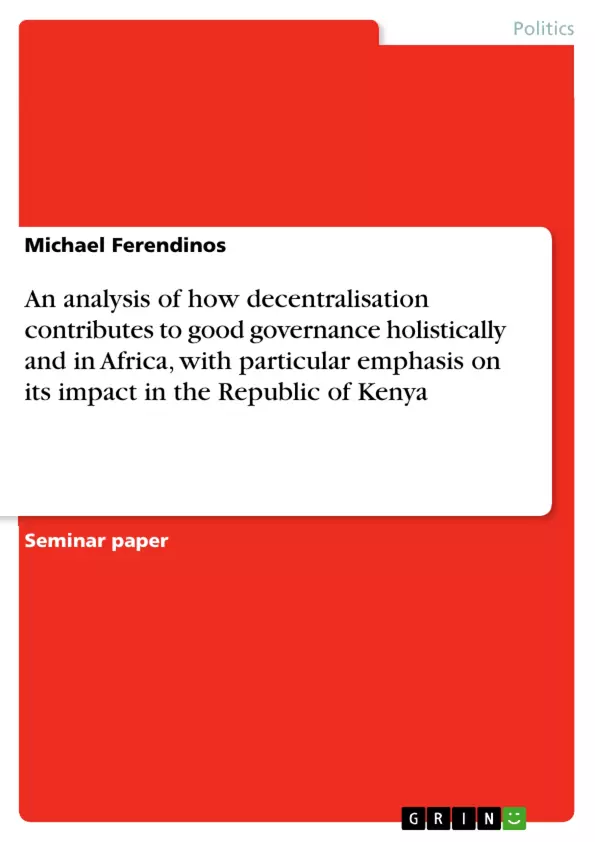Dele Olowu and Soumana Sako (2002) point out that it is no secret that governance on the African continent has been under the spotlight, and for all the wrong reasons. Their have been improvements, however, with a shifting from autocracy to democracy in many African states; this has resulted in a move to better or good governance due to this democratic change. Good governance is a complex issue and there is no distinction between good, democratic and participatory governance. Furthermore, there has been little consensus pertaining to the criteria that distinguishes between good, bad, or better governance.
This paper will not delve into the conceptualisation of good governance due to length restrictions. The bulk of the paper will provide a detailed analysis of decentralisation, as well as looking at systems of government and models of local government. That will be followed by an overview of decentralisation on the African continent, with specific reference to its impact on the East African state of Kenya. The influence of decentralisation has produced mixed reactions, depending on who it effects; the adequate conceptualisation and method of implementation of the term has also been disputed. This paper holds the position that decentralisation has had a positive effect on the continent as a whole as well as on Kenya.
[...]
Table of Contents
- Introduction
- Systems of government
- Decentralisation
- Advantages of decentralization
- Improved efficiency
- Improved governance
- Improved equity
- Decentralisation as a conflict resolution strategy
- Dimensions of decentralisation
- Fiscal decentralisation
- Institutional decentralisation
- Political decentralisation
- Models of local government
- Historical overview of decentralisation in Africa
- Post-independence
- The parastatal sector
- Decentralisation and local government reform
- Case Study: Kenya
- Government and Administration
- Federalism and Local Government
- Privatisation and Development Policies
Objectives and Key Themes
This paper analyzes the impact of decentralization on good governance in Africa, with a particular focus on Kenya. It examines different systems of government, explores the concept of decentralization, and assesses its advantages and challenges. The paper argues that decentralization, despite its complexities and varied implementations, has had a positive overall impact.
- Different systems of government (unitary vs. federal)
- The concept and implementation of decentralization
- Advantages of decentralization (efficiency, governance, equity)
- Decentralization's role in conflict resolution
- Case study of decentralization in Kenya
Chapter Summaries
The introduction sets the stage by discussing the challenges of governance in Africa and the complexities of defining "good governance." It then outlines the paper's focus on decentralization and its impact on Kenya. The subsequent sections delve into different systems of government, clarifying the distinctions between unitary and federal systems. A detailed examination of decentralization follows, analyzing its definition, its various dimensions (fiscal, institutional, political), and the advantages often attributed to it, including improved efficiency, governance, and equity.
The historical overview of decentralization in Africa, especially after independence, and the role of the parastatal sector is discussed. The case study on Kenya will likely focus on the country’s experience with decentralization in the context of its government, federalism, and development policies.
Keywords
Decentralization, good governance, Africa, Kenya, systems of government, federalism, unitary system, local government, development, poverty reduction, conflict resolution, fiscal decentralization, institutional decentralization, political decentralization.
Frequently Asked Questions
What is the relationship between decentralization and good governance?
Decentralization is seen as a key tool for improving governance by enhancing efficiency, increasing local participation, and ensuring better equity in service delivery.
What are the main dimensions of decentralization?
The three primary dimensions are fiscal (financial authority), institutional (administrative structures), and political (local decision-making power) decentralization.
How has decentralization impacted Kenya?
The paper argues that decentralization has generally had a positive effect in Kenya, particularly regarding local administration and development policies, despite implementation challenges.
Can decentralization help in conflict resolution?
Yes, decentralization is often used as a strategy to resolve conflicts by giving diverse regions or ethnic groups more autonomy and a voice in their own governance.
What is the difference between unitary and federal systems?
In a unitary system, central government holds supreme power, while in a federal system, power is divided between a central authority and constituent political units like states or provinces.
- Quote paper
- M.A. Michael Ferendinos (Author), 2007, An analysis of how decentralisation contributes to good governance holistically and in Africa, with particular emphasis on its impact in the Republic of Kenya, Munich, GRIN Verlag, https://www.grin.com/document/122890



